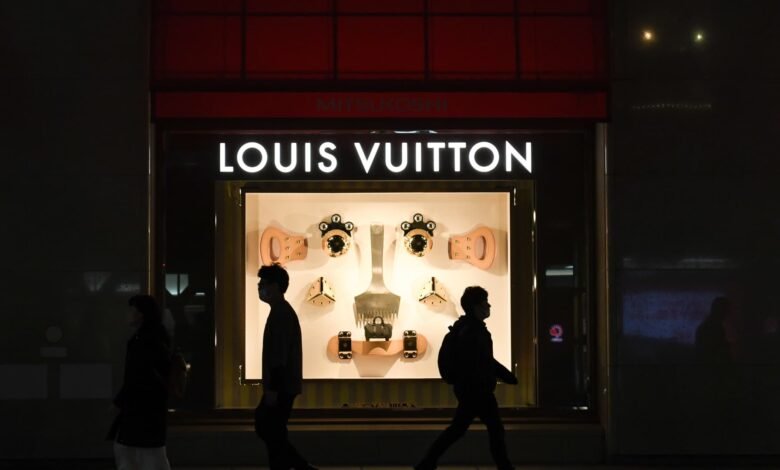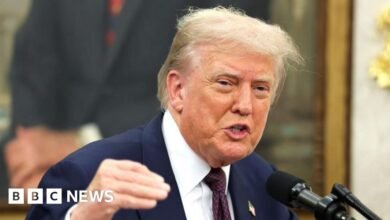LVMH plunge puts spot as world’s top luxury stock at risk after sales miss

Louis Vuitton store window display in Mitsukoshi department store in Tokyo, Japan, on Friday, April 4, 2025.
Bloomberg | Getty Images
Shares of LVMH plunged as much as 8% on Tuesday, at times losing its position as world’s largest luxury firm to rival Hermès after an unexpected decline in first-quarter sales.
LVMH reported a 3% year-on-year fall in first-quarter sales in a trading update published shortly after the market close on Monday, missing consensus analyst expectations for slight growth.
The results pulled down the wider sector in morning deals amid broader market gains. Kering shares declined 2.5%, Burberry fell 4.4% while Richemont traded 1.6% lower.
LVMH shares were down 7.55% at 12:28 p.m. in London, on course for the worst session since March 2020. A smaller 0.26% dip in the share price of Hermès saw the Birkin bag-maker’s market capitalization surpass that of LVMH.
The early afternoon moves put LVMH’s market capitalization at 244.7 billion euros ($277 billion) against Hermes’ 245.4 billion euros, according to a CNBC calculation of LSEG data.
LVMH spent several years as Europe’s most valuable company starting with 2021, as luxury stocks were buoyed by hopes of a post-Covid-19 pandemic boom. It has lost more 45% of its value since its record close in 2023.
It was overtaken by Danish drugmaker Novo Nordisk in late 2023 — before the maker of weight-loss drugs Ozempic and Wegovy was itself usurped by German software firm SAP in March 2025.
First-quarter drop
LVMH’s wines and spirits saw the sharpest revenue decline in the first quarter, down 9%, as it flagged weaker demand in the U.S. and China for cognac — the popular brandy variety that has been caught up in geopolitical tensions.
The key fashion and leather goods division, which accounted for 78% of profit in 2024, slid 5%. Sales of watches were flat.
Europe was the only region to record growth, up 2% on an organic basis. Asia excluding Japan plunged 11%, U.S. sales were 3% lower, while Japan was down 1%.
Citi analysts Thomas Chauvet and Mahesh Mohankumar said in a Monday evening note that there was “not much to cheer for at the luxury bellwether,” with sales “overall below the most conservative buyside expectations.”
They added that it was difficult to foresee sequential revenue improvement in the second and third quarters for either LVMH or the luxury sector while U.S. and global economic uncertainty remained elevated.
“Whilst structural growth drivers remain in place, shorter term visibility is very limited, especially in light of trade tension and tariffs… The next positive catalyst for LVMH/the sector would likely need to come from a macro surprise, as fundamentals will likely remain tough in the short term,” Bank of America Global Research analysts said in a note.
Tariff impact
The luxury sector, reliant on global supply chains and U.S. consumer demand, is facing a host of headwinds from U.S. President Donald Trump’s volatile trade policy.
LVMH, which owns brands including Louis Vuitton, Moët & Chandon and Hennessy, is the first major European luxury firm to report first-quarter earnings since Trump announced — and then delayed — reciprocal tariffs on its global trading partners.
As such, investors are eager for an indication of the firms’ forward guidance on the potential impact of tariffs on input costs and consumer demand.
LVMH Chief Financial Officer Cecile Cabanis told analysts in a Monday call that the group had not seen a “major change in trend” in the first quarter and that it continued to see solid growth in the past six months.
“It’s true that aspirational clientele is always more vulnerable in less positive economic cycles and uncertainties, and it might have had some impact in the recent weeks, but rather on categories like wines and spirits and beauty,” Cabanis said, according to a FactSet transcript.
Cabanis declined to comment specifically on pricing in the second quarter, but said that it would consider using repricing of goods as a level to moderately offset inflation or swings in currencies.
Luxury brands are expected to be more sheltered than other retailers from the immediate impact of tariffs, with high-end labels typically better able to pass on added costs to wealthy consumers.
Still, analysts have warned that the potential for a tariff-induced economic downturn could weigh heavily on demand —particularly in the key U.S. and China markets — further delaying the sector’s recovery from a period of prolonged weakness.
https://image.cnbcfm.com/api/v1/image/108131280-1744622493958-gettyimages-2207959293-JAPAN_ECONOMY.jpeg?v=1744622579&w=1920&h=1080
2025-04-15 11:36:36





